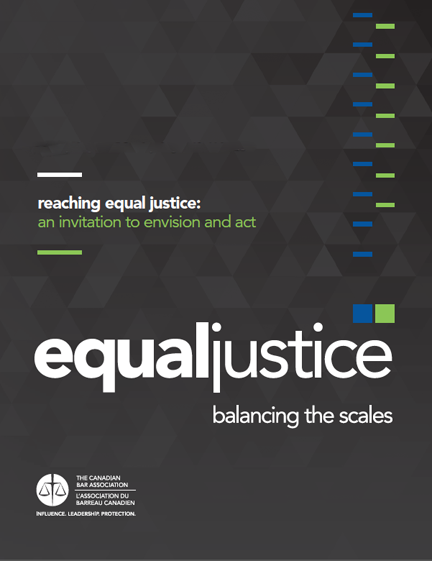SASKATOON — The “abysmal” state of access to justice in Canada can be turned around by 2030, according to a Canadian Bar Association report published today.
 But the report says hitting the deadline will require “dramatic” change, and sets out 31 recommendations for the legal industry, regulators, and government.
But the report says hitting the deadline will require “dramatic” change, and sets out 31 recommendations for the legal industry, regulators, and government.
These include establishing national benchmarks for legal aid coverage, increasing federal justice spending, and drawing up clearer guidelines on alternative billing structures.
"Reaching equal justice: An invitation to envision and act" says priority must be given to “the abysmal state of access to justice in Canada today.”
“We need to make visible the pain caused by inadequate access and the huge discrepancies between the promise of justice and the lived reality of barriers and impediments,” says Melina Buckley, chairwoman of the CBA's access to justice committee. “Inaccessible justice costs us all, but visits its harshest consequences on the poorest people in our communities.
“We cannot shy away from the dramatic level of change required: too many people think that justice in Canada is only for the rich and that our system of justice is broken,” says Buckley. “We need to radically redress this imbalance.”
The report highlights Canada’s “shocking” ranking on international justice indicators, and cites research showing legal aid spending has stayed flat for many years despite significant increases to health and education budgets.
“We need to make visible the pain caused by inadequate access and the huge discrepancies between the promise of justice and the lived reality of barriers and impediments,” it says.
Measuring access to justice more efficiently would help to direct funding where it is needed and highlight areas of need, the report argues. It recommends annual access to justice metrics reports, a national research strategy, along with “aspirational” national targets for legal aid coverage.
The expansion of legal expense insurance, particularly in the area of family law, may also help people to access legal services, the report says.
Lawyers should continue to consider pro bono as a “professional obligation,” it states. Under the authors’ vision, all lawyers would volunteer their services at some point in their career.
It says: “Though we are all busy, we can integrate this change in perspective, to work simultaneously on the matter at hand while contributing to broader systemic goals.
“For lawyers, this challenge can be seen as an extension of our professional duty as officers of the court.”
It also calls for more community engagement on justice issues, steady increases in federal contributions to legal aid funding, and improved technology in the courts system.
2030 has been set as a deadline for achieving equal justice across Canada, a timeframe that fits with broader objectives such as the United Nations Millennium Development Goals
The 51-page report is a summary of issues due to be explored in more depth in a paper this fall. The CBA has also offered a "map" of its A2J plans.
 But the report says hitting the deadline will require “dramatic” change, and sets out 31 recommendations for the legal industry, regulators, and government.
But the report says hitting the deadline will require “dramatic” change, and sets out 31 recommendations for the legal industry, regulators, and government.These include establishing national benchmarks for legal aid coverage, increasing federal justice spending, and drawing up clearer guidelines on alternative billing structures.
"Reaching equal justice: An invitation to envision and act" says priority must be given to “the abysmal state of access to justice in Canada today.”
“We need to make visible the pain caused by inadequate access and the huge discrepancies between the promise of justice and the lived reality of barriers and impediments,” says Melina Buckley, chairwoman of the CBA's access to justice committee. “Inaccessible justice costs us all, but visits its harshest consequences on the poorest people in our communities.
“We cannot shy away from the dramatic level of change required: too many people think that justice in Canada is only for the rich and that our system of justice is broken,” says Buckley. “We need to radically redress this imbalance.”
The report highlights Canada’s “shocking” ranking on international justice indicators, and cites research showing legal aid spending has stayed flat for many years despite significant increases to health and education budgets.
“We need to make visible the pain caused by inadequate access and the huge discrepancies between the promise of justice and the lived reality of barriers and impediments,” it says.
Measuring access to justice more efficiently would help to direct funding where it is needed and highlight areas of need, the report argues. It recommends annual access to justice metrics reports, a national research strategy, along with “aspirational” national targets for legal aid coverage.
The expansion of legal expense insurance, particularly in the area of family law, may also help people to access legal services, the report says.
Lawyers should continue to consider pro bono as a “professional obligation,” it states. Under the authors’ vision, all lawyers would volunteer their services at some point in their career.
It says: “Though we are all busy, we can integrate this change in perspective, to work simultaneously on the matter at hand while contributing to broader systemic goals.
“For lawyers, this challenge can be seen as an extension of our professional duty as officers of the court.”
It also calls for more community engagement on justice issues, steady increases in federal contributions to legal aid funding, and improved technology in the courts system.
2030 has been set as a deadline for achieving equal justice across Canada, a timeframe that fits with broader objectives such as the United Nations Millennium Development Goals
The 51-page report is a summary of issues due to be explored in more depth in a paper this fall. The CBA has also offered a "map" of its A2J plans.







